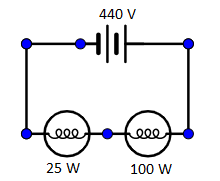Question
Question: If two bulbs of \(25\;{{W}}\) and \(100\;{{W}}\) rated at \(200\,V\) are connected in \(440\,V\) sup...
If two bulbs of 25W and 100W rated at 200V are connected in 440V supply, then
(A) 100 watt bulb will fuse
(B) 25 watt bulb will fuse
(C) none of the bulb will fuse
(D) both the bulbs will fuse
Solution
The resistance of each bulb will be different hence they have different powers. The voltage across each bulb has to be found using the resistance. Then the result will be compared to the voltage rating of the bulbs. By using the formula of the power, then the solution will be determined.
Complete step by step solution:
Given two bulbs having power, P1=25W and P2=100Wboth are rated at voltage, V=200volts and connected in series with 440 volts supply.

The expression for power is given as,
P=RV2
Where, V is the voltage and R is the resistance.
From the above expression,
R=PV2
Hence, we can find the resistance of each bulb using this equation for the given power and voltage rating.
⇒R1=P1V2 ⇒25W(200V)2 ⇒1600Ω
The resistance of 25W bulb is 1600Ω.
And,
⇒R2=P2V2 ⇒100W(200V)2 ⇒400Ω
The resistance of 100W is 400Ω.
Since the two bulbs are connected in series, the total resistance will be R1+R2.
The voltage across each bulb will be different. They are connected to 440 volts supply also.
Hence, the voltage across the 25W bulb is given as,
⇒V1=440V×R1+R2R1
Substituting the values in the above expression,
⇒V1=440V×1600Ω+400Ω1600Ω ⇒352V
The voltage across 25W is 352V. This is higher than the rated voltage 200volts. Therefore, the bulb will fuse.
The voltage across 100W bulb is given as,
⇒V2=440V×R1+R2R2
Substituting the values in the above expression,
⇒V2=440V×1600Ω+400Ω400Ω ⇒88V
The voltage across 100W is 88V. This is lower than the rated voltage 200volts. Therefore, the bulb will not fuse.
Therefore, only the 25W bulb will fuse.
The answer is option B.
Note: If two bulbs have the same voltage rating but the power is different, then a bulb having high power will have low resistance. And the low power bulb will fuse than the high power bulb. The power is directly proportional to the square of the voltage and inversely proportional to the resistance.
